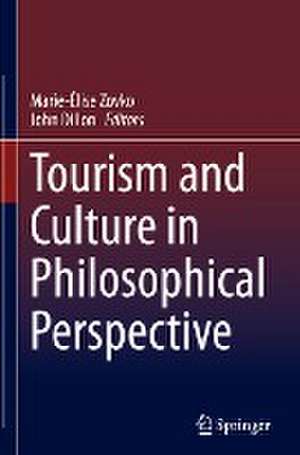Tourism and Culture in Philosophical Perspective
Editat de Marie-Élise Zovko, John Dillonen Limba Engleză Hardback – 11 noi 2023
Preț: 735.07 lei
Preț vechi: 896.43 lei
-18% Nou
Puncte Express: 1103
Preț estimativ în valută:
140.66€ • 147.16$ • 116.84£
140.66€ • 147.16$ • 116.84£
Carte disponibilă
Livrare economică 13-27 martie
Preluare comenzi: 021 569.72.76
Specificații
ISBN-13: 9783031366581
ISBN-10: 3031366581
Pagini: 295
Ilustrații: XII, 295 p. 1 illus.
Dimensiuni: 155 x 235 mm
Greutate: 0.66 kg
Ediția:1st ed. 2023
Editura: Springer International Publishing
Colecția Springer
Locul publicării:Cham, Switzerland
ISBN-10: 3031366581
Pagini: 295
Ilustrații: XII, 295 p. 1 illus.
Dimensiuni: 155 x 235 mm
Greutate: 0.66 kg
Ediția:1st ed. 2023
Editura: Springer International Publishing
Colecția Springer
Locul publicării:Cham, Switzerland
Cuprins
Part 1: Introduction.- 1 Philosophical Issues in Tourism.- Part 2: Truth: Reality, Knowledge and Disciplines.- 2 Who is a Tourist? Conceptual and Theoretical Developments.- 3 What is Tourism? Definitions, Theoretical Phases and Principles.- 4 Epistemology, Ontology and Tourism.- 5 Post-disciplinary Tourism.- 6 The End of Tourism? Nomadology and the Mobilities Paradigm.- Part 3: Beauty: Well-being, Aesthetics and Art.- 7 Tourism and Restoration.- 8 Aesthetic Pleasures: Contemplating Spiritual Tourism.- 9 Nature, Beauty and Tourism.- 10 Tourism and the Aesthetics of the Built Environment.- 11 Tourism and the Arts.- Part 4: Virtue: Ethics, Values and The Good Life.- 12 Ethics and Tourism.- 13 Good Actions in Tourism.- 14 Against ‘Ethical Tourism.- 15 Development and its Discontents: Ego-tripping Without Ethics or Idea(l)s.- 16 Transmodernity: Remaking Our (Tourism) World?.
Notă biografică
Marie-Élise Zovko is a Senior Research Fellow with tenure at the Institute of Philosophy, Zagreb, Croatia, specialising in Platonism, Spinoza, Kant, German idealism and Romantic philosophy.
John M. Dillon is Professor Emeritus, a Classicist, Philosopher, and internationally renowned expert on Platonism. Professor Dillon taught at the University of California, Berkeley, USA (1969–1980), and served as Regius Professor of Classics, Trinity College Dublin, Ireland (1980–2006).
John M. Dillon is Professor Emeritus, a Classicist, Philosopher, and internationally renowned expert on Platonism. Professor Dillon taught at the University of California, Berkeley, USA (1969–1980), and served as Regius Professor of Classics, Trinity College Dublin, Ireland (1980–2006).
Textul de pe ultima copertă
This book offers a philosophical approach to tourism as a permanent factor in the lifestyle, economy, and culture of the contemporary global community. Travel to well-known destinations and pursuit of an ever-increasing range of leisure activities are an aspiration of most humans today. Those not themselves engaged in tourist activities are quite often involved in providing the goods and services which make tourism possible. Yet the ill effects of mass tourism and overtourism on sensitive ecosystems, resources, and community life have begun to outweigh economic gains, threatening to destroy destinations, cultural heritage, and livelihoods. The editors and contributors of this collection reflect on the nature and meaning of tourism, its history, elements, and forms, the roles of tourist and host, the limits of hospitality, tendencies to excess and the reasons why we engage in such forms of behaviour, and the place of tourism in human culture as a whole. By shedding light on these questions, more efficacious solutions to the urgent problems raised by the practice of tourism can be found. This work is a must-read for scholars, teachers, and students engaged in study and research on philosophy of culture, philosophical anthropology, tourist and destination management, human factors engineering, and sustainability.
Caracteristici
The first book of its kind to consider tourism itself as a phenomenon of human culture Deals with philosophical questions connected with tourism as a cultural phenomenon characteristic of our present age Questions the meaning and importance of tourism from a variety of philosophical standpoints
